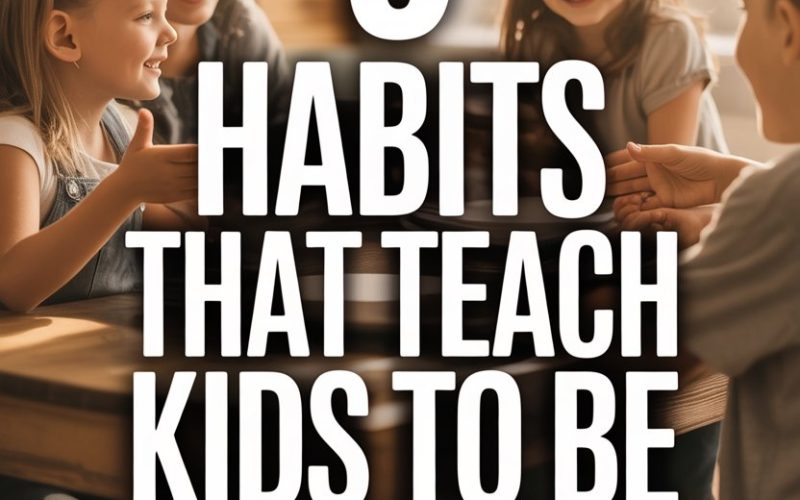If there’s one thing that unites parents from all walks of life, it’s the hope that our children will turn out to be decent, respectful human beings.
Sure, we’d also love it if they’d eat a vegetable now and then, but one battle at a time.
Raising respectful kids feels a lot like assembling flat-pack furniture—there’s always one piece that doesn’t fit and someone’s ready to throw a tantrum.
Luckily, you don’t need a manual (or an Allen key) for this one. Just a few habits, some consistency, and perhaps an emergency stash of chocolate for yourself.
Here’s how to build respect into your child’s life, one everyday habit at a time.
1. Model Respect in Everyday Life
You’ve probably heard the old chestnut, “Do as I say, not as I do.” Kids, being the wily creatures they are, see right through that.
Research from the Child Mind Institute actually confirms children are hardwired to mimic the people around them, especially the grown-ups.
Nothing quite says “mixed message” like demanding polite behaviour while muttering at the bloke who just nabbed your parking spot.
Try narrating respectful interactions out loud, even when you think your child isn’t paying attention. Saying “Thank you for your help” to a colleague on a call, or “Excuse me” when you bump into someone at the shops, sets a tone that sticks.
Slip respect into your daily banter. Address servers, cashiers, and your own kids with courtesy. When you get it wrong (because, let’s face it, nobody’s perfect), own up to it.
Apologising when you lose your cool teaches them that respect isn’t about being flawless; it’s about how you handle your inevitable human moments.
2. Set Clear and Consistent Expectations
Respect is a bit like bedtime: kids are far more likely to embrace it if they know exactly what it looks like.
That means spelling things out, often repeatedly. Yes, even when you feel like a broken record.
Describe what respectful behaviour means in your family. Maybe it’s listening when someone’s talking. Maybe it’s putting the iPad away when Gran wants to chat.
It can be tempting to assume they’ll “just know,” but even adults need reminders (see: every workplace meeting etiquette guide).
Find natural moments to prompt and remind. Before a playdate, mention, “When we share toys and take turns, it shows respect.” Before dinner, “Let’s all listen while each person talks.”
If you consistently reinforce these small moments, you’ll have fewer surprises when your child is suddenly channeling their inner attorney during a disagreement.
You don’t need to transform your home into a bootcamp. Gentle repetition, paired with calm reminders, beats a lecture any day. (Plus, “Because I said so” only works until they’re about five. After that, they’ll want to negotiate like they’re up for a raise.)
3. Praise Efforts and Progress, Not Just Perfection
Everyone loves a good gold star. But turns out, what makes a difference is shining a spotlight on effort rather than achievement.
Carol Dweck, the mind behind the concept of growth mindset, points out that praising a child’s attempts—even when they miss the mark—builds a sense of intrinsic motivation.
When your child attempts to resolve a sibling spat without turning the living room into a WWE arena, point out what they did well. “I noticed you tried to use your words instead of yelling. That’s respectful.” (And, incidentally, easier on the wallpaper.)
If your child interrupts, gently remind them and celebrate improvement: “Thanks for waiting your turn this time. That’s really mature.”
Over time, these small nudges help respectful habits become second nature.
Be specific with your praise. “Good job” is nice, but “I love how you helped clean up your crayons when I asked” gives a clear picture of what you value.
Resist the urge to wait for “perfect” behaviour before you say something. Spotting the small steps makes kids more likely to keep moving in the right direction.
4. Encourage Empathy Through Everyday Conversation
You can’t have respect without empathy. And while some children seem to have an innate ability to sense feelings, most need a bit of gentle coaching—think of it as emotional CrossFit.
Ask questions that help your child imagine life in someone else’s shoes. When a classmate is upset, try, “Why do you think they felt that way?” or “How would you feel if that happened to you?”
These little chats are like breadcrumbs, leading your child toward a more empathetic worldview.
Books are secret weapons here. Stories about different cultures, backgrounds, and perspectives spark conversations about feelings and fairness.
The American Academy of Pediatrics even suggests reading as a way to build empathy in children. If you’re too tired to read aloud, audiobooks count. So does dramatic storytelling (bonus points for silly voices).
When your child hurts someone’s feelings—by accident or on purpose—resist the urge to swoop in too quickly.
Ask them how they think the other person feels and brainstorm ways to make it right. Ownership, not just apology, is the real magic.
5. Teach the Art of Disagreement—With Decency
Every parent knows that children come pre-programmed with a strong sense of justice. (Why is it always the last biscuit?)
The goal isn’t to stamp out disagreement, but to teach kids how to voice their concerns without causing a family-wide meltdown.
Remind your child that it’s okay to disagree—as long as they do it respectfully. Phrases like “I see it differently,” or “Can I share my opinion?” give kids tools for tricky conversations.
Role-play works wonders. Take turns disagreeing about something silly—pineapple on pizza, anyone?—and model listening without rolling your eyes (or at least, not dramatically).
When arguments flare up between siblings or friends, act as a coach, not a referee. Guide them through taking turns, using calm language, and looking for solutions.
The Harvard Graduate School of Education recommends teaching children to focus on facts and feelings, not blame, during conflicts.
If voices get too loud (or opinions too spicy), call for a quick break. Even grown-ups need a moment to collect themselves before returning to the debate.
Teaching kids to step away and cool down is a life skill that can save many a relationship down the road—plus your eardrums.
Respect Starts at Home—and Grows With Practice
Teaching respect isn’t about grand gestures or elaborate rules.
It’s really about the small, daily habits that add up. The thank-yous at the dinner table. The apologies when tempers flare.
The moments you stop, listen, and let your child tell you about their day—even when you’re half asleep and their story involves seventeen different Minecraft pigs.
Kids learn by watching, by practicing, and by knowing they’re loved even when they get it wrong.
Will they mess up? Absolutely. Will you have days when you wonder if anything is sinking in? Also yes.
But those tiny moments of kindness and courtesy—the ones you model, praise, and encourage—are building blocks for a respectful adult.
At the end of the day, raising respectful kids isn’t about perfection. It’s about persistence, patience, and maybe laughing when things go sideways.
And if all else fails, there’s always chocolate.




